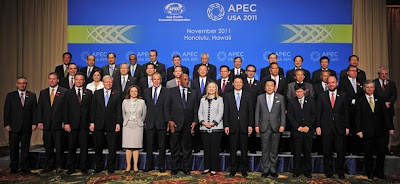Remarks at APEC Ministerial Kickoff
RemarksHillary Rodham Clinton
Secretary of State
Hawaii Convention Center
Honolulu, Hawaii
November 11, 2011
SECRETARY CLINTON: Good morning, everyone. Let me invite you, please, to find your chairs. And we want to get started with this ministerial meeting kickoff, and I’m delighted to join with Ambassador Kirk in welcoming all of the foreign and economic ministers, the officials and representatives from APEC’s member economies, and the international organizations that are here today. I would also like to acknowledge Mike Froman, chairman of the APEC Senior Officials Meeting, and all of the hardworking teams that have done the preparatory work in order for this meeting to be held and be successful.
The United States is proud to serve as host of this year’s APEC Leaders Meeting. Global trends and world events have given us a full and formidable agenda, and the stakes are high for all of us. We are each trying to generate balanced, inclusive, sustainable growth that delivers good jobs for our citizens; economic, social, and environmental progress for our nations; and shared prosperity for this region.
To accomplish these goals, we have to create a rules-based system that is open, free, transparent, and fair. Working to make that system a reality has been the focus of all of our meetings this year, in Washington; in Big Sky, Montana; in San Francisco; and now here in Hawaii. We even created an unofficial slogan: “Get stuff done.” And we have.
We’ve made tangible progress in three areas. First, integrating markets and expanding trade. We have focused on what we call next-generation issues – for example, by working to help owners of small and medium-sized businesses reach new customers beyond their borders.
Second, promoting green growth. We have advanced a trade initiative for environmental goods and services which will help spur industries investing in green growth. We’ve worked to reduce inefficient fossil fuel subsidies, which will help protect the environment by reducing the wasteful consumption of fossil fuels. And we are renewing our commitment to reduce our energy intensity by at least 45 percent by 2035.
Third, deepening our regulatory cooperation and convergence. In recent years, we have seen how improvements in this area can unleash billions of dollars in commercial activities. For example, when a majority of APEC countries adopted a uniform safety standard for televisions in 2005, exports for the region increased by 45 percent over the subsequent three years.
I think that the steps we have taken have moved us forward. We’ve reaffirmed our commitment to meet World Bank benchmarks that will make it easier to do business in each of our countries. We’ve launched a new effort to make travel easier and more secure throughout the Asia Pacific region. I’m pleased to announce today that the United States will begin issuing APEC business travel cards to eligible U.S. citizens in the near future.
And to ensure that our work reflects the real world challenges that confront the people who help power our economies, we consulted with a broad range of business leaders at key events on energy, innovation, and health. At our meeting in San Francisco, for example, we engaged with CEOs on how APEC countries can more effectively invest in the economic potential of women, whose talents and contributions still, unfortunately, often go untapped. And we reaffirmed – or we affirmed the San Francisco Declaration, which lays out a roadmap for how the APEC economies can and will maximize women’s contributions toward economic growth.
Now, I am well aware that we all have differences in our individual approaches to economic policymaking, but I also know that we share the belief that markets, trade, and investment are vital to our prosperity. So today, I look forward to hearing from everyone about ways we can continue to build an enduring regional economic architecture that is open, free, transparent, and fair. Above all, I hope we can continue to find ways to achieve real results and, yes, get stuff done.
With that, I’d like to turn to my co-chair, who many of you on both the trade and economic side, as well as the foreign ministerial side, have come to know because of his great energy and commitment. Ambassador Kirk.





















